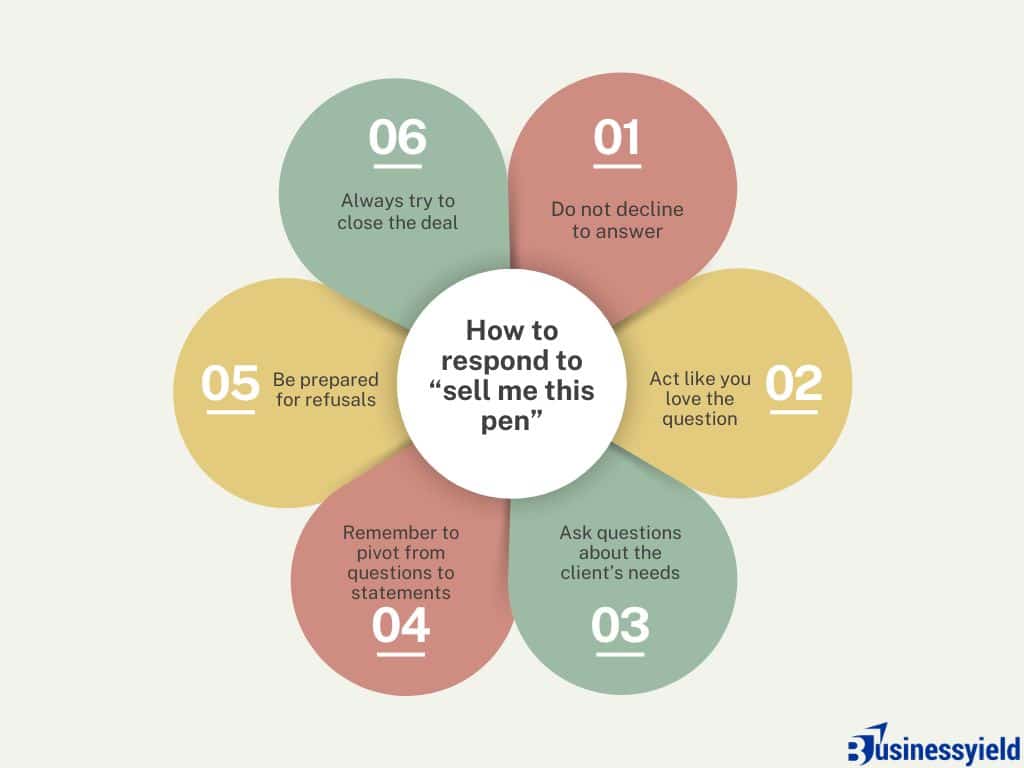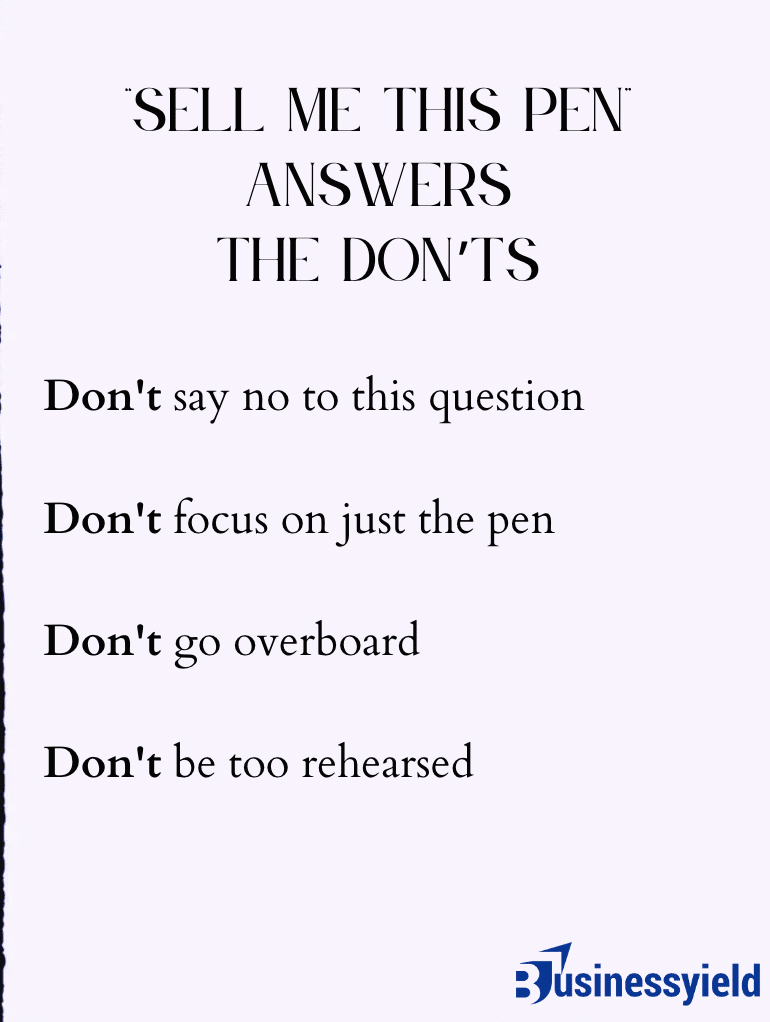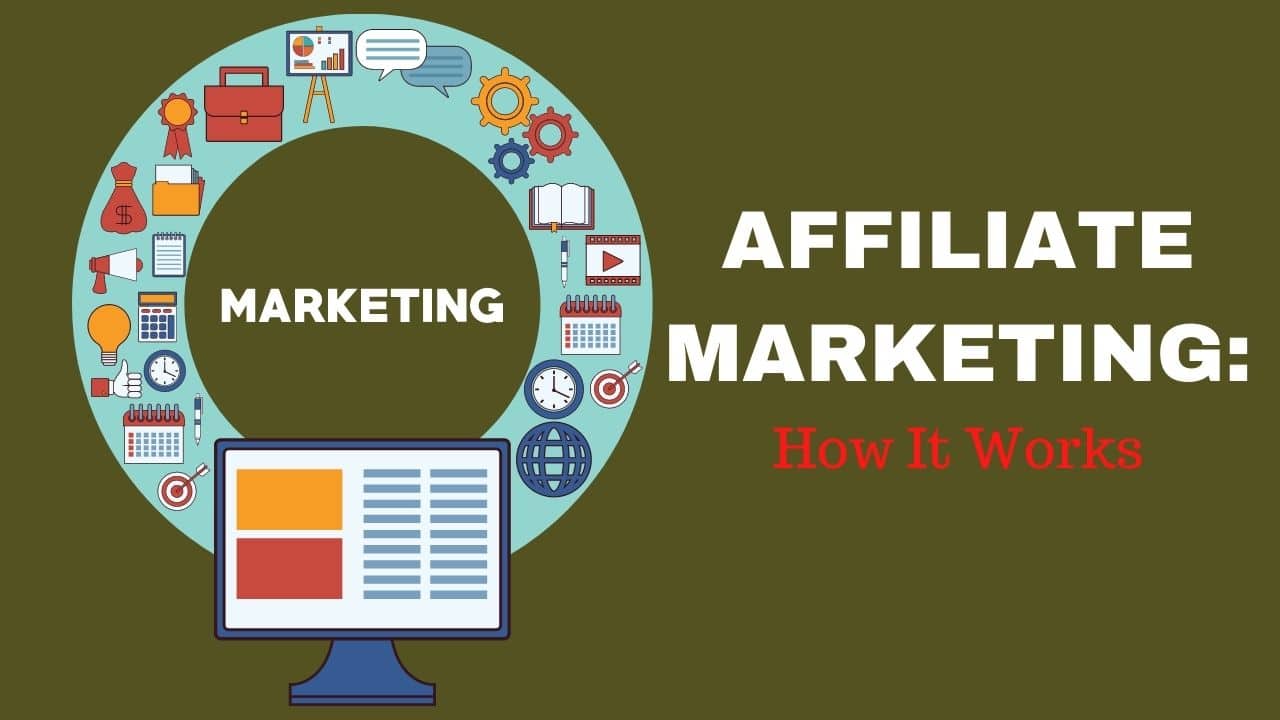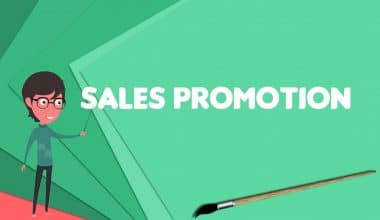Imagine walking into a job interview and, without any introduction, the interviewer picks up a pen from the desk, holds it up to you, and tells you to answer the question, “Sell me this pen”. At first, you may be flustered, because it’s her pen, isn’t it? Why does she want you to sell her own property to her? Or did she perhaps borrow the pen from another department, and she wants you to sell it to her so she can claim proper ownership?
If you think along those lines, then, I’m sorry to say, but your chances of getting that job just got slimmer. The question is not some strategy in a pen-ownership war; rather, it is to help the hiring manager assess your sales skills and approach, regardless of whether you’re applying for an entry-level or more senior position. How you respond to those four words can tell you a lot about how—and how well—you will sell.
Key takeaways
- “Sell me this pen” is one of the most popular job interview questions.
- If you’re looking for a job in sales, it’s a good idea to be prepared for this question.
- There are good approaches and bad approaches to this question and your response could be a game-winner or a deal-breaker.
- Learning how to answer this question can help you improve your employability and distinguish you from other job candidates.
Sell me this pen: Why do interviewers still ask this?
The “sell me this pen” or “sell me this product” question has become extremely popular, and most interviewees are likely to have an answer prepared. Over the years, interviewers have tweaked the question to replace the word pen with sunglasses, books, files, and whatnot. While the product changes, the question remains the same. So, why is this question still popular? And no, it’s not just because it’s an easy question to ask.
The reason the “sell me this pen” question comes up regularly in interviews is because it’s a quick, comparatively easy way of checking a candidate’s sales tactics. Not to mention, the popularity of the sell me this pen question also allows interviewers to test a candidate’s confidence, communication skills, level of preparedness, and creative approach.
SEE: WHAT MOTIVATES YOU: How To Answer This Tricky Interview Question
Here are the major reasons why interviewers ask questions on how to sell a product in an interview:
- Assessing your sales approach. Sales reps use several different approaches to sell. From creating a value-proposition for the customer to catering to a customer’s desires. With this question, interviewers want to understand how you approach sales. Simply put, it’s a way to see your sales pitch.
- Assessing your communication skills and confidence. Good communication and confidence are not just required for a sales position, but for any role you apply for—even in B-schools. How you answer the “sell me this pen” question can go a long way in showing whether you can communicate confidently or not.
- Assessing problem-solving skills. At its core, the interviewer is creating a problem by asking the “sell me this pen” question. The way you solve this problem indicates your approach to the commonplace problems you may encounter during the sales process or in school. And here, your answer speaks volumes about not just your problem-solving skills, but also your attitude toward problems.
- Assessing your creativity. If you’re straight away jumping into your well-rehearsed and prepared “sell me this pen” answer, you’re doing it wrong. The popularity of this question indicates that the most common answers are done to death. This is why, now this question is also a way for an interviewer to see how creatively you solve a problem or approach a situation.
There are generally three standard responses to this question — each of which illustrates one of the three selling styles typically used by salespeople.
The value-added approach
Also known as value-added selling, this is where you attempt to create interest by highlighting the various features of the product that make it desirable. You may say something like:
- “This pen is gold — that positions you as a person of value to your peers.”
- “This pen has refillable ink cartridges, so you’ll never need to buy a new one.”
- “Compared to others, this pen is very smooth and comfortable to hold.”
Most people without selling experience will use this method because it is the most straightforward. However, the problem with value-based selling is that you show zero knowledge of what the buyer feels is important to them. There’s been no discovery. You’re making blind inferences with your assertions of value.
To put it bluntly, you’re shooting in the dark. If you’re lucky, one of your guesses will stick, but more often than not, it cuts you off.
The solution-based approach
This is when you successfully ask questions about what the prospect looks for in a pen and if they have any problems with my current one. Then, you build the case that the pen will solve their needs.
- “What is the most important thing for you when buying a pen?”
- “What color pen are you in the market for?”
- “What were the strengths and weaknesses of the last pen you owned?”
This may be your strong suit if you have a background in enterprise sales. However, you may still hit a roadblock when the questions lead to a conclusion where the customer needs a solution you can’t offer.
For instance, you can find out if a customer is in the market for a pen, but they may need a red one when you’re only selling black. Plus, there’s no guarantee a buyer will keep answering your questions. They might not even be interested in talking about their problems with someone they don’t know.
The solution-based approach is better than the value-added one, but there’s still a good chance it’ll take you nowhere.
The problem-creation approach
Problem creation is, without question, the best way to “sell me this pen.”
Reps who use this tactic establish a clear “ladder” for buyers to follow using questions that make them concerned about problems they didn’t even know about in the first place.
With this approach, the buyer arrives at a pre-set conclusion, which the sales representative has orchestrated. This is the best possible outcome. If you can successfully take this route, then you have the kind of grip on the sales process that every hiring manager wants to see.
Pro tip: This is a common sales interview question. A sales interview is an open opportunity to sell yourself and show off your sales skills—know what questions to expect, prepare your answers, practice your pitch, and show up confident for the big day.
READ : Ace the Interview – How Recent College Graduates Can Overcome Anxiety and Land a Job
How to respond to “sell me this pen”
If an interviewer can get a good sense of your personality and motivation from a single question, why wouldn’t they ask it? Believe it or not, “sell me this pen” is not as much of a brain-bender as it seems.

By following the tips below, you’ll be prepared to sell your heart out and show the employer what you’re made of:
1. Do not decline to answer
You may find the question objectionable, as you are probably not a pen salesman, and be tempted to say, “I don’t sell pens, I sell real estate.” You might also be tempted to pass on the question, saying, “I don’t really feel comfortable trying to stage a demonstration of my sales skills right now.”
Neither of these is a good reply. Interviewers ask this question for a reason, and they expect an answer. They want to see if you’re comfortable in your salesman’s skin when pitching a product. They want to see what approach you take and how much you focus on the pen vs. how much you focus on the potential buyer.
2. Act like you love the question
You may actually dread a question like this, but you will win points if you embrace it enthusiastically. If you’re in sales, you have to love selling, so your eyes should light up at the prospect of doing what you’re good at.
If you look blindsided and stressed, saying, “Oh, boy,” taking a deep breath, and running your hands through your hair, it makes it look like the prospect of selling something makes you uncomfortable. This is not encouraging for a company looking for a salesperson.
When you hear this question, be prepared to launch happily, confidently, and comfortably into your response.
3. Ask questions about the client’s needs
In an interview, Piers Morgan asked Jordan Belfort, the inspiration for The Wolf of Wall Street, how he would answer this difficult question. Belfort served 22 months in prison for fraud, and he’s probably never sold a pen, but there’s no question he’s an ace salesman.
Belfort’s response was: “‘How long have you been in the market for a pen? … And what type of pen do you typically use when you use a pen?’ ” The idea here is that when you’re selling something, you need to ask questions first to find out what their needs are.
The biggest mistake in the world is that salesmen say, ‘This is the best pen in the world, it writes upside down, it defies gravity’—if you do that, you sound like a moron, basically….
I don’t want to sell a pen to someone who doesn’t need a pen. So the first thing you do is ask questions. Otherwise, you’re basically jamming a pen down someone’s throat.”
This is good advice, as it focuses on the customer’s needs. Your need may be to sell a pen, but the customer is not worried about your needs. It is up to you to align their need with yours.
4. Remember to pivot from questions to statements
When selling a pen, at some point you have to sell the pen. So once you’ve done your due diligence by feeling out the client’s needs, you need to transition to making statements about the product you have for sale.
Belfort rightly emphasizes that you shouldn’t launch straight into a description of the pen. But once you’ve learned more about the client’s needs and wants, you should be well-versed in the features of the pens you sell.
You may want to mention its sleek, sophisticated look, its refillable cartridges, its lightweight size, how easily the ink flows, etc. Again, don’t lead with this, but you must be prepared to describe the excellent features of the product you’re selling.
5. Be prepared for refusals
Your interviewer may choose to take a hard-nosed tack, saying, “I don’t need a pen,” “I don’t want a pen,” or “I can’t afford pens like that.”
Dealing with objections effectively is part of good sales tactics. Sometimes people will want something without needing it. Or they don’t want it because they don’t know how much they need it. It is up to you to make them realize this.
But, in the end, if a client doesn’t want to buy the product you’re selling, you also need to be prepared to take no for an answer. They might not need a pen, but they might know someone who does.
6. Always try to close the deal
Even if you don’t make a successful sale in the interview, do close the process. A common mistake that candidates make is leaving the question hanging, either because they’re convinced they’ve made the sale. Or because they get flustered at coming up with a good answer. This is not an ideal situation.
If you do succeed in selling the pen, have a good closing statement. For example, “If there are any other stationary needs that I can help fulfill, please don’t hesitate to reach out.” This shows you have the skills to build a relationship and increase sales. Even if you fail to make a sale, you still close. Perhaps with a statement along the lines of, “I understand that this pen didn’t suit your needs and I do not wish to take up more of your precious time. However, several other items may interest you and I’d be happy to take you through our products at a time of your convenience.”
This shows you can move on from rejection – a natural part of the sales process. It also shows you have what it takes to generate a lead.
Below is a checklist outlining a structured approach you can use to ace this question:
How to answer the “Sell me this pen” question in an interview
Remember, no interviewer is expecting you to come up with a properly developed sales strategy. But they do expect you to have a fair idea about how the sales process works, and to use your skills to achieve the best possible results. Following these simple steps can certainly make it easier to answer the dreaded sell me this pen question.
CHECK THIS OUT: STAY INTERVIEWS: Tips for Conducting Stay Interviews (+Example questions)
What not to do when giving an answer to “sell me this pen”
There are some red flags that you should be wary of while answering the “sell me this pen” question.

1. Don’t say no to the question
Once again, this is very important. You should not decline to answer the question. Certainly, there may be many questions that you may not know and for which you may politely say that you do not have any knowledge about them. However, “sell me this pen” is certainly not one of those questions. Answering it is not optional.
Refusing to answer may decrease your chances of getting a job offer or getting selected at your dream B-school. Be very confident and optimistic while answering.
2. Don’t focus on just the pen
Many people get apprehensive after listening to this question. The first thing that crosses their mind is, ‘Let me focus on just the qualities’. But they forget the first rule that Belfrost himself talked about and the cornerstone of selling—knowing the customer.
Thus, first, understand the customer’s need, and then emphasize those features that can meet those needs. When you are selling, focus on the person sitting in front of you, that person’s needs, goals, etc. Simply put, don’t just focus on the pen, also focus on the person you’re selling the pen to.
3. Don’t go overboard
While it’s a good skill to get creative with your answers and even offer lucrative deals, remember to not go overboard. Your answers may have loopholes, but they can’t exist in the realm of imagination.
4. Don’t be too rehearsed
Yes, you’ve prepared an answer to this question. And the interviewer is well aware of the facts. So don’t just start reciting the answer; rather, turn the answer into a sales pitch and make it a conversation. Also, try not to learn any answers. Rote learning is certainly not the way to go in an interview.
If you’ve memorized the answer but not understood the technique of answering the “sell me this pen” question, a change in the question can very well throw you off and cause you to stumble.
Examples of answers to “Sell me this pen”
Sample Answer 1
Interviewer: Sell me this pen.
Me: Sir, our company has recently introduced it in the market. You should use it. It’s very good.
Interviewer: Prove it.
Me: Sir, what is the normal life of the refill of a pen if used frequently?
Interviewer: It’s about 7 days.
Me: And our pen works for 2 months when used in the same frequency.
Interviewer: Okay. what is its cost?
Me: It costs 4 times the cost of your pen.
Interviewer: Then why should I buy an expensive pen?
Me: Because it will be economical for you. Let me break out the math here. If you use your pen frequently then how many refills do you have to change within a period of 2 months.
Interviewer: About 8 or 9.
Me: And what is the cost of each refill of your pen?
Interviewer: About Rs. 5.
Me: So, the total cost of refills becomes Rs. 40–45 for 2 months, right?
Interviewer: Right!
Me: Now our pen’s single refill works for 2 months straight without getting exhausted. And the price of our pen’s one refill is 4 times that of your pen’s refill and that is 5 multiplied by 4, that is Rs. 20. So, your expenses on refills for 2 months will reduce to less than half! It’s like a long-term investment that is extremely beneficial for you.
Interviewer: How do I know that your pen’s refill will work for 2 months?
Me: Sir, this is a sample pen I am giving you for free. Take this and see by yourself. If you get satisfied with it, order the whole carton of it.
Interviewer: Why the whole carton?
Me: Because our pen’s ink does not dry for 5 years. So, there is no harm in keeping the stock. Who knows that in future because of inflation, our company may increase the price of the pen! So, it’s a win-win situation for you to order the stock.
Interviewer: I am ordering the stock.
(Interview Source: Quora)
Sample Answer 2
Interviewer: Sell me this pen.
Me: Sure sir. (Lifts the pen) (Drawing out my own Parker and addressing it) Hello sir! I would like to know – Do you have any children?
Interviewer: Yeah, I have a daughter.
Me: Does she go to school yet? What grade is she in?
Interviewer: She’s 12 years old and is studying in 7th grade now.
Me: I’m sure soon she must be having exams this season. How does she fare in her exams?
Interviewer: She does really good. She is always amongst the top 3 in her class.
Me: Sir, here I have this, Parker Pen. Just before the exam – I suggest you hold her hands, tell her how great she is going to do and gift her this pen. It would really give her the needed inspiration to get to the top this time.
Interviewer: How much is it worth?
Me: I’ll give you one for 250 bucks.
Interviewer: 250 is way too much, I can only spare a 50.
Me: Then, sir, I think you could try this one (Lifting the pen he gave), sparing only 50 bucks, even with a best of luck hug, you would still need a pen.
And I think this one is good enough. After all, does a daughter really care if her father gifted her a Parker or just a simple pen with that hearty best of luck?
(Interview Source: Quora)
Sample answer 3:
Interviewer: Sell me this pen.
You: What are you looking for in a pen?
Interviewer: I don’t know, I’ve got a few.
You: Do you love your pens? And do you have that one go-to pen that you use on important occasions because you know it writes well and looks great?
Interviewer: Not really. Sometimes I carry a couple of pens in case the first one stops writing.
You: What do you use a pen for? Do you jot down notes during a meeting or phone call? Do you sometimes use a pen to sign important documents or contracts, or even letters or Christmas cards?
Interviewer: I’ve done all the above.
You: And if you use a pen in front of others, do the optics matter to you? Would you prefer to use the kind of pen used by well-to-do people, or will just any old pen do?
Interviewer: I have to admit a nice-looking pen is good to have. But the utility is all-important – it has to work.
You: Perfect. The thing about nice pens is they not only look good, but they write great. This pen right here is one of our newer models, it has some gold plating on top of sterling silver, but it’s not all that heavy, and it writes like a dream. Take it, find a piece of paper on your desk and sign your name. You don’t have to scribble on a piece of scratch paper first to see if the ink comes out – I guarantee you the ink will come out.
Interviewer: Yeah, it writes pretty nice.
You: And it’s not “expensive” – it’s “valuable.” You can afford this pen, and you can carry it with you everywhere. Refillable cartridges will make sure you never run out of ink.
Interviewer: I don’t know, I usually try to sleep on it before making a purchase.
You: Tell you what. Keep the pen a week, use it every day, see if it disappoints you. I’ll come back next Tuesday, and if you don’t like it, I’ll take it away. If you do like it, but you’d like to see some other options, I’ll bring you some other options. But this pen is yours to use for free for a week, no obligation.
Interviewer: Sounds like an offer I can’t refuse.
SEE: Mastering E-commerce Optimization: Strategies for Maximum Sales Growth
“Sell Me This Pen” Answers: In conclusion
The “sell me this pen” question is not just a random one, but rather one that you should know how to answer well. It can impact your chances of success in an interview.
Best of luck in crafting your own responses to the “Sell me this pen” challenge. As a salesperson, your greatest asset is the force of your personality, so use it for all it’s worth. Be different, be interesting, be humorous, and be prepared.
And above all, sell that pen!






